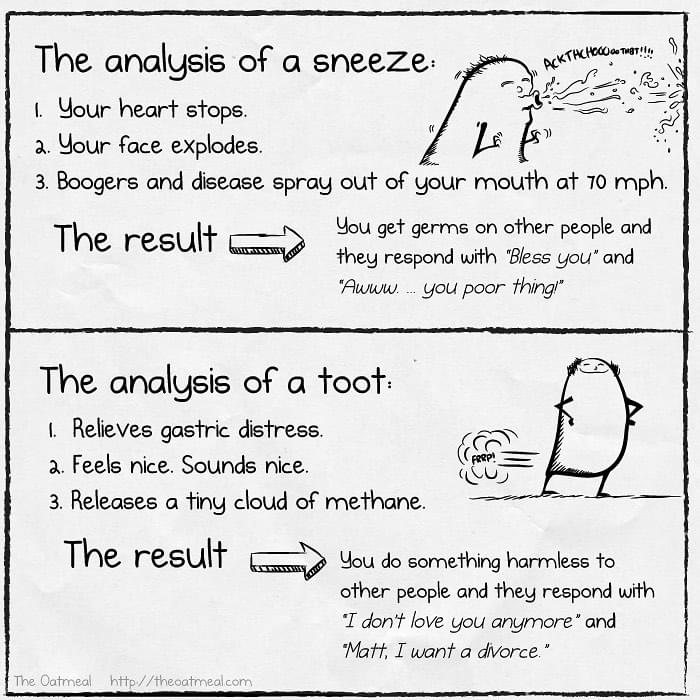Leaderboard
Popular Content
Showing content with the highest reputation on 10/12/22 in all areas
-
2 points
-
I would also like a question answered ... I brought it up previously, but it was dismissed. Assume Bob and Alice are in two different frames, separated by large distance. Bangstrom confidently says that Bob makes the first measurement, and a 'signal' then determines Alice's measurement. Special Relativity tells us that there may be a question as to who made the measurement first, as they can only compare their measurements much later. Is this 'signal' then, frame dependant ? Does it travel from Bobs frame to Alice's, when he has made the first measurement in his frame ? And does it travel from Alice's frame to Bob's when she has made the first measurement in her frame ? This is indeed a 'magical' signal. Makes one suspend belief in reality between the two measurements. Which is exactly what we've been telling you !2 points
-
Today I learned gold is not silvery-shining and reflected light from gold gets more reddish because relativistic effects contract the interior shells. Thanks to @exchemist1 point
-
The undergraduate explanation for the colour of gold is based on electrons in atoms with very high nuclear charge moving at such speeds and thus, in terms of non-relativistic QM, having a greater effective mass than they would otherwise: https://math.ucr.edu/home/baez/physics/Relativity/SR/gold_color.html1 point
-
The act of selling water automatically desecrates it; it would make the user break out in hives. Sanctity is not a commercial commodity. Just as churches repurposed for secular functions must be deconsecrated, and documents must be declassified with stable genius mind-waves before they go on the auction block, so the Jordan water needs to be decontaminated and unblessed before it can be mail-ordered.1 point
-
I have questions. If you use holy water and soap to wash your dishes, does that make the dishes holy? Or just cleaner? How does holy and unholy balance? Is there a way to quantify them when, say, I eat pork (unholy to Jews and Muslims) off the plates washed with holy water? Could the holy and unholy cancel out in that situation? If I drink holy water which then hydrates my stool, does that produce holy s--t? Or was drinking the water a bad action which taints my innards? Also concerned about sources like the Jordan River - if someone dumps garbage or effluent in the river, does God get irate? Will he punish the person? Were is the scientific proof you mention that Zamzam Water decreases fatigue? This needs a citation.1 point
-
Correct link: The Nobel Prize in Physics 2022 - Popular science background - NobelPrize.org The advanced information might be of interest: The Nobel Prize in Physics 2022 - Scientific background - NobelPrize.org. The document gives some historic background, describes experimental setups, mathematics. It comments on what realist and local means in the perspective of the prize. Note: I find no support in the paper for any "faster than light" or "instant signals". The paper is focused on the science behind establishing the violation of Bell inequalities.1 point
-
That goes well into the realm of science fiction. Metal ions are too small to be antigenic (which is a good thing, else our immune system would wreak havoc). Simple peptides generally do not have good metal binding capacities (or high specificity), usually there are additional modifications metabolization steps needed (same for artificial metal-binding peptides). But generally speaking, in order to get rid of something via chelation, you want high water solubility and small molecular weight, so that it can be excreted via urine. Invoking microbiota seems like yet another magic wand argument, especially as we have little success even in modifying composition in a lasting way, much less modify them to specific purposes. But I think overall the argument is backward. First you would need to figure out a compound that actually has the specificity needed to sequester specific metals but leave essentials (which are generally present at much higher concentrations) alone, and then one could think about how to administer them. Genetic manipulation is a fairly high hurdle, especially when it comes to functional manipulation of mammals (much less the ethical issues with humans) so it would be the last, not the the first step. In fact, one could simply take a look what kind of chelators are provided to treat metal poisoning. Typical compounds use are EDTA, succimer, D-penicillamine and succimer. They are used for similar ranges of metals (most commonly lead, mercury and arsenic) and most tend to bind a rather broad range of metals with various affinity. All have side effects and are generally not commended for preventive use. So unless a new compound comes along without the noted issues, we do not to dream about bioengineering something that would provide this marvelous compound.1 point
-
In any terms that matter, he's already lost, and did the moment Ukraine didn't fall within a few days of the start of the attack. The action ended up having the opposite effect he wanted. It solidified NATO, and actually influenced two nations, previously reluctant to do so, to join. It exposed the Russian military as being a paper tiger( It has lost its position as being considered the third most powerful military, with other nations now in the running for that honor). Instead of strengthening the Russian Empire, it has crippled it. Even He were to finally prevail in terms of capturing Ukraine on the battlefield, all he will have done is have taken some ground. The major goals of the invasion have already evaded him.1 point
-
There are ways to reward chores without money, and likewise there are ways to reward behaviors that aren’t chores. For example, when my oldest displays an unsolicited act of kindness or does something helpful out of the blue for their sibling, I’ll often toss over a few bucks to do with as they please. The goal of the reward is to drive future behavior. We can choose which behaviors to reward in pursuit of that end. To the OP, amount also depends upon where one lives and how wealthy or how desperately enmeshed in poverty they are. For millions, the very idea of an allowance is itself a luxury.1 point
-
Might be helpful in this chat to distinguish between work and chores. I doubt anyone here disagrees that school is the important job for ten year olds or would suggest we have them join the labor force in fields or factories. Chores are valuable for reasons addressed by several here. Pete set out the protocol for extra funds for extra work, and setting standards of quality, in useful detail. The OP asks an unanswerable question: what is a typical amount. Even knowing the context of nation, specific locale, socioeconomic condition, attitudes towards consumerism, prevailing fashions, etc, it would be hard to define "typical."1 point
-
I don't expect a 10 year old to work. They don't owe their parents anything... it was the first-world parents wish, presumably, to have them.1 point
-
You can change the spin, or with photons change the polarization. With the latter you just send it through a half-wave plate. All this does is change the correlated states. If the initial entanglement was up/down (or H/V for photons) then you've made the correlation to be the same state. If you measure a spin to be up, you know the other is up. These actions do not inherently break the entanglement1 point












